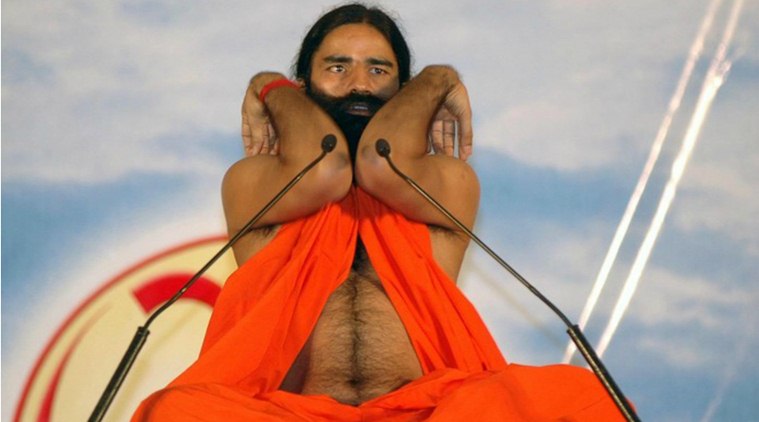 The Ministry of Ayush has ordered Patanjali to stop publicising claims of Covid-19 cure
The Ministry of Ayush has ordered Patanjali to stop publicising claims of Covid-19 cure
A DAY AFTER Ramdev launched an ayurvedic ‘Corona Kit’ claiming it cured Covid-19, serious questions have emerged over the business practices of Patanjali Ayurved Ltd, the FMCG company that markets Patanjali brand products and Divya Pharmacy, the unit producing the medicines.
On Wednesday, a day after the Ministry of Ayush ordered Patanjali to stop publicising claims of Covid-19 cure, the Uttarakhand government said its licencing authority did not grant any approval to the Corona Kit, and the Rajasthan government told The Indian Express it had no knowledge of clinical trials at National Institute of Medical Sciences and Research (NIMS), a private hospital in Jaipur where Covid-19 patients are admitted.
Most significantly, when mildly symptomatic patients developed fever during the trials, they were administered allopathic medicines. As it is, the trials were conducted only on asymptomatic and mildly symptomatic patients. Severely symptomatic patients and those with acute respiratory distress syndrome were excluded for enrolment.
Moreover, the study based on these trials at NIMS, are not peer-reviewed, admitted Dr Ganpat Devpura, Principal Investigator, NIMS, Jaipur.
When contacted, Devpura told The Indian Express, “This is just an interim report with a sample size of 100 Covid-19 patients. The final report and the findings will be published after 15-25 days and then it will be sent for peer review.”
When questioned if allopathic medicines were administered to mildly symptomatic patients during the trial when they developed symptoms, Devpura said, “Yes, if patients had developed symptoms like fever, symptomatic treatment was given.”
Elaborating on the interim findings of the trial, Devpura said, “It is a double-blind randomised trial. 50 patients were on placebo and the remaining 50 were on active drugs (the Ayurvedic therapy). We did the RT PCR test on Day 1, Day 3, and Day 7. On Day 3, 69 per cent active patients tested negative; in the placebo group, only 50 per cent were tested negative.”
“On Day 7, in the active group, all the remaining patients tested negative; in the placebo group, 65 per cent were negative, and remaining 35 per cent continued to test positive for Covid-19,” Devpura said. In the active group, patients received Swasari Ras (500 mg), pure Ashwagandha extract (500 mg), pure Giloy extract (500 mg), pure Tulsi extract (500 mg) and Anu taila nasal drops.
In Covid treatment, doctors continuously measure inflammatory markers to monitor the severity of the infection. As part of assessing “secondary outcomes”, this study too examined an important inflammation marker – Interleukin 6 (IL-6), a cytokine, which shows excessive response on the immune system in severe patients. Devpura admitted that the reduction in IL-6 was “not statistically significant” in active patients during the trial.
Balkrishna, Managing Director, Patanjali Ayurved Ltd, however, claimed the controversy was “finally” resolved. Attaching a note by the Ministry of Ayush which acknowledged the receipt of documents of the clinical trial including site of a clinical study and medical research, Institutional Ethics Committee clearance, registration details of CTRI, study protocol, sample size and study results data, he said, “The resolution of AYUSH controversy finally.”
“Ministry will have the study documents verified for validation of the data of the research outcome,” the Drug Policy Section, Ministry of Ayush said.
However, the Uttarakhand government’s notice to Divya Pharmacy and the Rajasthan government’s denial that any approval was accorded for conducting the clinical trials, raise serious questions about Patanjali Ayurved’s business practices.
In a letter to Divya Pharmacy, the Uttarakhand Drug Licensing Authority categorically stated that no permission was granted to the firm to manufacture the “corona kit”. It said approval was given to swasari for treating cough and breathlessness, and to the coronil tablet as an “immunity booster, specially against respiratory tract infection and all fevers”.
Pointing out that the firm had displayed an image of Coronavirus on the tablet, the licencing authority said this was in violation of relevant sections under the provisions of Drugs and Magic Remedies (Objectionable Advertisements) Act, 1954, and asked why action should not be taken to cancel the licence for manufacturing these medicines.
In Jaipur, Rohit Kumar Singh, Additional Chief Secretary (Health), told The Indian Express, that the government did not have any knowledge about these trials and did not receive any request for authorisation. “As per due process, the state government is informed before such a trial, and we refer the request to the state’s clinical trial committee and ethics committee. After getting permission from these committees, we forward the request to the Drug Controller General of India (DCGI) and the Indian Council of Medical Research (ICMR) who give the final approval,” he said.
“NIMS had only asymptomatic patients. It can’t be said that this particular medicine treated them successfully within a few days,” said Dr Narottam Sharma, Chief Medical Health Officer, Rajasthan University of Health Sciences.
Rajasthan Health Minister Raghu Sharma said the clinical trial process was done without following the due process and without informing the government. “There are clear guidelines for clinical trials which weren’t followed. During a pandemic threatening the world, this sort of action is absolutely unacceptable. We weren’t informed before these clinical trials took place despite the fact that patients admitted at NIMS are being monitored by the state government. I have instructed officials to take action if any attempt is made to sell this drug as a potential medicine of Covid-19 in Rajasthan,” he said.